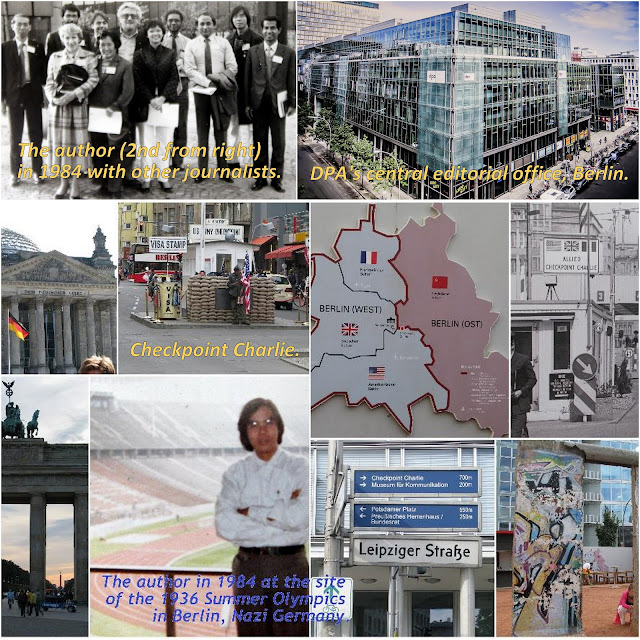Volume 6, Issue No. 16
OPINION/COMMENTARY
/ News That Fears None, Views That Favor Nobody /
Our latest as of Friday, November 22, 2024
~ The memory of a visit to Germany four decades ago lingers and just won't fade away because in between the years, something historic happened - the fall of the Berlin Wall on November 9, 1989. I was there five years before it was toppled, thus putting an end to the once iconic symbol of the Iron Curtain.
. . . . . . . . . . . . . . . . . . . . . . . . . . . . . . . . . . . .
ICONIC SYMBOL OF THE IRON CURTAIN
The Memory of the Berlin Wall Lingers
The Concrete Divider Was Toppled Starting Nov. 1989
By ROMEO P. MARQUEZ
Editor, The Filipino Web Channel
“If you would understand anything, observe its beginning and its development.” – Aristotle
TORONTO - "Mr. Gorbachev, tear down this wall," U.S. President Ronald Reagan uttered on June 12, 1987 at Brandenburg Gate in the very heart of the German capital.
He was calling on Soviet leader Mikhail Gorbachev to dismantle the Berlin Wall, the concrete barrier erected in 1961 separating West and East Berlin, the latter made the capital of the German Democratic Republic.
Two years and five months later on November 9, 1989, the Wall that had been the symbol of conflicting ideologies hardwired in the so-called Iron Curtain, started to come down.
From the time of its downfall to this day, 35 years have passed, but the memory lingers of my first visit to Germany, including a tour of its major cities, in October 1984 - five years before it was toppled.
As a young journalist, I was in East Berlin, from thence to West Berlin, and finally to West Germany (the capital then was Bonn), which was outside the Soviet bloc, trying to absorb the political, social and cultural ramifications of two different ideologies embodied in the division.
Related video: German Parliament at the Reichstag Building in Berlin
I wake up every morning this week reminiscing the days. The Cold War is gone. East Germany and West Germany are gone, but reunited in one Germany. The Soviet Union is gone and splintered into 15 smaller independent countries.
Still, my mind draws me back to the time I visited Germany, again, in September 2012. This time, I paid a courtesy call on one of the editors of Deutsche Presse Agentur, the German news agency, at the central editorial office in Berlin.
(Related video:
The sight of Berlin was vastly different from when I saw it 40 years earlier when it was apportioned to the four powers - the United States, France, United Kingdom, and the Soviet Union.
Perhaps my interest in history, and the fact that I worked as a foreign correspondent for DPA, my employer for nearly two decades, were reactivating my consciousness.
The DPA stint had compelled me to learn more about Germany, for in many ways, as its correspondent, I was representing Germany's largest news agency in Manila and everywhere I went to cover the news.
That also necessitated a basic study of the history of Europe, its politics, economics and its social and cultural norms. The knowledge is important in writing a story for with it, one knew who you're grappling with.
The 1984 trip to Germany, including visits to Berlin, Bonn, Cologne, Frankfurt, Hamburg, and Munich, had been a learning experience from both professional and personal perspective.
I was visiting not as a tourist - and that limited my movement - but as a journalist in the employ of the German news agency and a guest of the German government.
My return in 2012 enhanced whatever impression I gained, learning more about Germany's history, particularly that chapter regarding the Nazis, Adolf Hitler, and his attempt to conquer Europe.
I've supplemented my readings of history books by watching the documentary series about the the Second World War now streaming on Netflix. That's where my reminiscences started.
One episode is instructive and jaw-dropping - that the world's greatest naval battle between the United States and Japan took place on the Philippine Sea, the vast ocean expanse that opens to the Pacific Ocean.
(Background: https://en.wikipedia.org/wiki/Battle_of_the_Philippine_Sea).
But it's in Germany where I really touched the most consequential moments in history - the Berlin Wall, the Brandenburg Gate, the Reichstag, Hitler's alleged burial ground, the Soviets' monument to victory over the Nazis, the Holocaust memorial, and so many other things in between. They're all etched in memory. (Copyright 2024. All Rights Reserved).


No comments:
Post a Comment